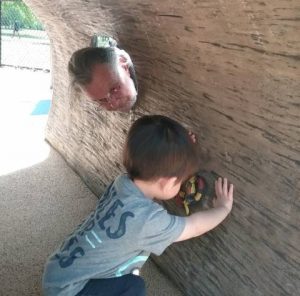Death Threat: The Unique Dangers of Grieving in Recovery…From The Fix…
By Christopher Dale

Though I’ve developed tools for dealing with heartache and anguish in sobriety, this level of grief is a sadness on steroids against which I feel futile and frightened.
In a bookstore, a grown man and a toddler, holding hands, walk away from the camera.
That my two-year-old son won’t remember his great uncle adds to my sorrow. Image via author
My father’s older brother, Stephen Dale, died at age 69 in mid-August. He was more than the family’s patriarch; he was its ballast, its mooring. The home he made with my aunt Linda served as safehouse to a chaotic tribe on holidays, birthdays, and just-for-the-hell-of-it pop-ins.
Uncle Steve and I enjoyed a relationship where calls and text messages about long-debated or joked about topics would rouse the other in real-time. “Hey Uncle Steve, guess what I just saw…” We lived our lives in each other’s pockets — an intimate, instant-access closeness that is simply irreplaceable.
He died very suddenly. One day he was there; then the next morning, before I could even reach the hospital, he was gone. Massive heart attack. By the early afternoon, I was writing the obituary, a prelude to the eulogy I would deliver days later.
But this is not an obituary, nor a eulogy. This is about what happens next — when a recovering alcoholic, like me, finds himself mired in grief and unable to anesthetize himself with drugs or alcohol. It’s about the specific attributes of grief that, I’m finding, are particularly dangerous to people in recovery. And it’s an attempt to identify with my peers who may have suffered similarly but, as often happens to me, couldn’t quite congeal their disjointed feelings into a cohesive narrative.
Grieving has peculiarities and pitfalls for those of us in recovery. Let’s discuss why.
Pain That Many Know, Reactions That Few Experience
Everyone in recovery has heard the cliché: “Bad things don’t stop happening just because you got sober.” In my seven years of sobriety, my wife has miscarried and, during her next pregnancy, I had a small stroke a week before our son was born.
And given the recovery forums in which we now find ourselves — AA meetings, SMART, sober networks, etc. – most of us see death. We witness fellows with a common disease relapse and die. A record 72,000 Americans died of drug overdoses in 2017. I personally knew three of them — people who, sadly, literally couldn’t get clean to save their own lives.
But Uncle Steve is different. He knew more about my past, my present and my psyche than anyone save my wife. He was incredibly well-read and unyieldingly tolerant, a combination that made him my chief counsel and safest sounding board. He was flesh and blood that, given a world of other options, I would have chosen to be my flesh and blood.
A lot of us have Uncle Steves, that most special of relatives. Upon losing that person, anyone — normie or alky — suffers a harsh blow. We feel like a piece of our foundation has been uprooted, part of our shared history deleted. There are secrets about us that die with our Uncle Steves. They leave an unfillable hole, forever, and we know it.
For those of us in recovery, though, grief of this depth has its own oddities and perils. Strangely, upon learning the terrible news, our initial reaction can be both validating and shame-inducing: When I learned that Uncle Steve had died, my very first thought was “Shit, I can’t drink over this.” And because I knew I couldn’t, I knew I wouldn’t; the work I’d done in sobriety was about to pay off again, big time.
Though comforting, this survival-minded reassurance brought an unsettling guilt exclusive to recovering addicts: the self-congratulation of passing a tough test to sobriety. It was just the beginning of what has become an ongoing struggle to rectify grief with recovery.
Disruption, Deserved.
Many of us in recovery have struggled mightily with both temperament and resentments. As someone for whom anger has been a tremendously burdensome issue, one AA literature passage that has always resonated with me is from the Twelve Steps & Twelve Traditions. In the chapter discussing Step Ten, it cites justifiable anger as an emotion that “ought to be left to those better qualified to handle it.” Alcoholics are inherently tone deaf when it comes to the level of outrage a given situation warrants – usually, we overshoot it considerably.
In sobriety, then, we work to temper most of our emotions — good and bad — to find a balance most of us never knew. My dramatically downplayed demeanor has been a crucial element to my recovery. In this space a few months ago, I discussed the importance of limiting the amount of people, places and things that can “anger, intimidate, or otherwise derail” us. In my opinion, this is as true a marker of sober progress — and maturity — as exists.
Grief, however, sticks out from this everyday mantra like a sore thumb. Especially when we lose someone of Uncle Steve-caliber closeness, deep sadness is not only justified but altogether appropriate. In fact, lack of sadness could be considered insulting to the deceased… our dead loved one deserves our emotional disruption. We owe our Uncle Steves that.
For those of us whose recovery includes maintaining healthy habits and routines, the combination of a broken stride and broken heart is uniquely troubling. The aversion we’ve built up to emotional disturbances can be a disservice to our sobriety in these instances.
Since my uncle’s passing, I’ve found myself nipping around the edges of a turbulent sea of grief, afraid to do anything more than dip my toe in lest I drown. Though I’ve developed tools for dealing with heartache and anguish in sobriety, this level of grief is a sadness on steroids against which I feel futile and frightened.
More than anything, I fear that wading into these waters may lead directly to diving into a bottle; as far-fetched as that may seem for those of us with longstanding recovery, this guarded approach to our most valuable asset — our sobriety — is entirely understandable. In grief, however, it can become a hindrance — a defense mechanism stranding us ashore, emotional landlubbers.
At least a portion of this procrastination, I realize, is rooted in fear of a less drastic reversion. With seven solid years of recovery, I know the chance of a physical relapse from this is slim. For one, it would be the absolute last thing Uncle Steve wanted. Whether they were in recovery themselves (my uncle was not an alcoholic), our Uncle Steves are vital aspects of our sobriety, and drinking or drugging upon their deaths is undoing part of their legacy. For that reason, among others, getting drunk over this is a nonstarter.
No, what many of us fear upon losing an Uncle Steve isn’t physical relapse, but rather regressing to a state of heightened emotional vulnerability. In addiction and fledgling recovery, we were often hypersensitive and underprepared to meet life on life’s terms. Now, atop solid sober ground, meeting death on death’s terms feels like a rare, even unique scenario capable of causing a catastrophic earthquake.
Sure, I’ve been shaken in sobriety before — but not this violently. I’m afraid of the aftershocks of so seismic an event. In recovery, we have healthy fears not only of drinking and drugging, but of revisiting the level of emotional rawness that made us stuck in addiction in the first place.
Gradually, in recovery we’ve pieced our lives back together, and we don’t want these blessings to unravel in one calamitous emotional nosedive. This may ring particularly true with the multitudes of addicts who, like me, also have struggled with depression. Regardless, everyone in recovery can recall a time when emotional fragility made us unable to adequately function. As a husband, father and career communicator, it’s that panicked, fuzzyheaded state that I most fear.
Like hard truths in early recovery, though, I’m finding that Uncle Steve-level grief has a ready-or-not resonance. When we lose someone that close, there’s simply too many things in our day-to-day lives that remind us of the deceased. Almost daily, I find myself reaching for my phone to share something Uncle Steve would find equally interesting or humorous. The resulting double-edged sword leaves me both missing my uncle and mad at myself for forgetting, albeit momentarily, to miss him.
And more frequently, during fleeting moments of calm in my crowded-with-blessings sober life, Uncle Steve is there, quietly commanding attention. Ever patient, his spirit seems to loom as large, or as little, as I can handle in that moment. I swallow manageable doses of sadness with limited side effects and reassurance that, like in recovery, more will be revealed.
That last sentence would have made for an artful sign-off, but life — or death — seldom provides such tidiness. As much as a loss can be a learning experience it is still, on the whole, a loss. And, like some of our worst acts in full-blown addiction, sometimes the knowledge and growth bestowed in recovery aren’t enough to offset the bad with the good. Some transgressions can’t be wiped away with transcendence.
Uncle Steve has been gone two months and I, a recovering addict whose present peak required a series of bottoms, still subconsciously — and egotistically —expects this is building toward something grander than the inglorious absorption of tragedy. Often, our post-relapse recoveries from addiction have been linear, accruing wisdom and utilizing lessons learned. I keep waiting for Uncle Steve’s death to ascribe to a similar, simpler healing process – an expectation that has proven persistently misguided.
No such revelations exist. In the end, those of us who struggle with addiction, despite being affected by grief in ways that differ from others, must deal with it in the same fashion: imperfectly, inconsistently, and with ultra-personalized feelings toward the dearly departed that were endearing in life but alienating in death. Unlike recovery, there’s no program for losing our Uncle Steves.

